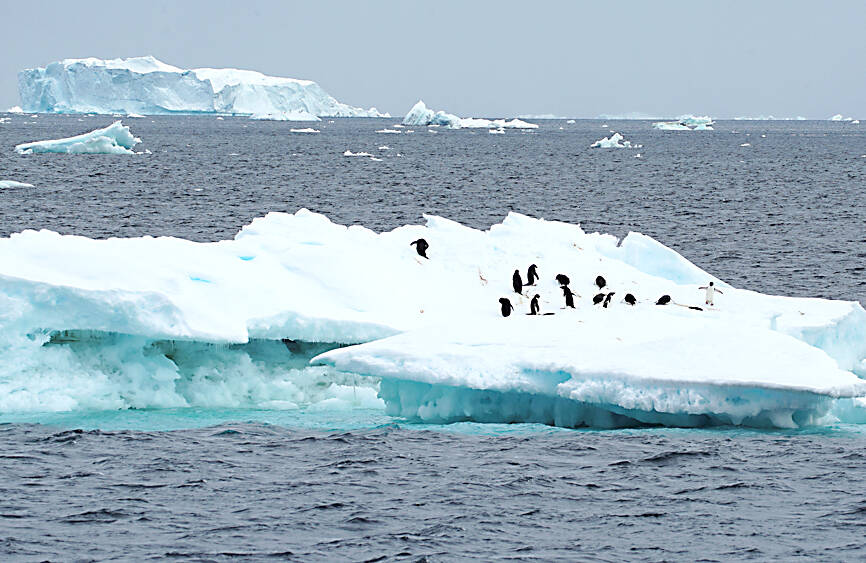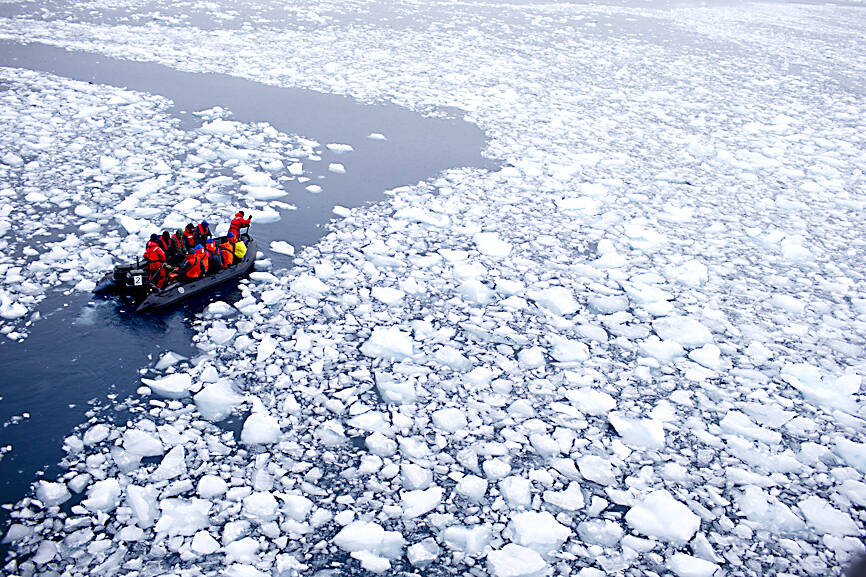Sea ice in the antarctic region has fallen to a record low this year as a result of rising global temperatures and there is no quick fix to reverse the damage done, scientists said yesterday in a new study of the impact of climate change on the continent.
The continent’s minimum summer ice cover, which last year dipped below 2 million square kilometers for the first time since satellite monitoring began in 1978, fell further to a new low in February, a study published in the journal Frontiers in Environmental Science said.
“It’s going to take decades if not centuries for these things to recover. There’s no quick fix to replacing this ice,” said Caroline Holmes, polar climate scientist at British Antarctic Survey and one of the study’s coauthors.

Photo: Reuters
“It will certainly take a long time, even if it’s possible,” she told a briefing with journalists.
This year’s sea ice minimum is 20 percent lower than the average over the past 40 years, equivalent to a sea ice loss nearly 10 times the area of New Zealand, said Tim Naish, director of the Antarctic Research Centre at New Zealand’s Victoria University of Wellington, who was not a participant in the study.
“In some cases we are getting close to tipping points, which once crossed will lead to irreversible changes with unstoppable consequences for future generations,” Naish said.

Photo: AP
Global warming driven by the burning of fossil fuels has made Antarctica more vulnerable to extreme events and the impact is “virtually certain” to get worse, the study said.
Climate change would “lead to increases in the size and frequency” of heat waves, ice shelf collapses and declines in sea ice, it said, drawing on recent evidence from scientific studies of the antarctic ocean, atmosphere, cryosphere and biosphere.
The precise impact of climate change on Antarctica and the surrounding ocean has been uncertain and scientists have struggled to measure how much global warming is affecting the thickness of antarctic ice.
However, from phenomena such as the rapid decline in sea ice, it is “scientifically reasonable” to assume that extreme events are going to intensify as global temperatures rise, said Martin Siegert, a glaciologist at the University of Exeter and another coauthor.
Last year, an “atmospheric river” originating from Australia drove subtropical heat and moisture into the continent, causing unprecedented temperatures up to 38.5oC above normal, the largest variance from the norm the world has ever experienced.
Siegert described the temperature increase as “absolutely astonishing,” adding that if it had occurred during the Antarctic summer, instead of winter, it would have triggered melting on the surface of the East Antarctic ice sheet, which has so far been spared from melting.
“Antarctica is fragile as an environment, but extreme events test that fragility,” he said. “What we’re deeply concerned about is the increase in intensity and frequency of extreme events and the cascading influences that they have in other areas.”

A Chinese aircraft carrier group entered Japan’s economic waters over the weekend, before exiting to conduct drills involving fighter jets, the Japanese Ministry of Defense said yesterday. The Liaoning aircraft carrier, two missile destroyers and one fast combat supply ship sailed about 300km southwest of Japan’s easternmost island of Minamitori on Saturday, a ministry statement said. It was the first time a Chinese aircraft carrier had entered that part of Japan’s exclusive economic zone (EEZ), a ministry spokesman said. “We think the Chinese military is trying to improve its operational capability and ability to conduct operations in distant areas,” the spokesman said. China’s growing

Nine retired generals from Taiwan, Japan and the US have been invited to participate in a tabletop exercise hosted by the Taipei School of Economics and Political Science Foundation tomorrow and Wednesday that simulates a potential Chinese invasion of Taiwan in 2030, the foundation said yesterday. The five retired Taiwanese generals would include retired admiral Lee Hsi-min (李喜明), joined by retired US Navy admiral Michael Mullen and former chief of staff of the Japan Self-Defense Forces general Shigeru Iwasaki, it said. The simulation aims to offer strategic insights into regional security and peace in the Taiwan Strait, it added. Foundation chair Huang Huang-hsiung

PUBLIC WARNING: The two students had been tricked into going to Hong Kong for a ‘high-paying’ job, which sent them to a scam center in Cambodia Police warned the public not to trust job advertisements touting high pay abroad following the return of two college students over the weekend who had been trafficked and forced to work at a cyberscam center in Cambodia. The two victims, surnamed Lee (李), 18, and Lin (林), 19, were interviewed by police after landing in Taiwan on Saturday. Taichung’s Chingshui Police Precinct said in a statement yesterday that the two students are good friends, and Lin had suspended her studies after seeing the ad promising good pay to work in Hong Kong. Lee’s grandfather on Thursday reported to police that Lee had sent

BUILDUP: US General Dan Caine said Chinese military maneuvers are not routine exercises, but instead are ‘rehearsals for a forced unification’ with Taiwan China poses an increasingly aggressive threat to the US and deterring Beijing is the Pentagon’s top regional priority amid its rapid military buildup and invasion drills near Taiwan, US Secretary of Defense Pete Hegseth said on Tuesday. “Our pacing threat is communist China,” Hegseth told the US House of Representatives Appropriations Subcommittee on Defense during an oversight hearing with US General Dan Caine, chairman of the Joint Chiefs of Staff. “Beijing is preparing for war in the Indo-Pacific as part of its broader strategy to dominate that region and then the world,” Hegseth said, adding that if it succeeds, it could derail